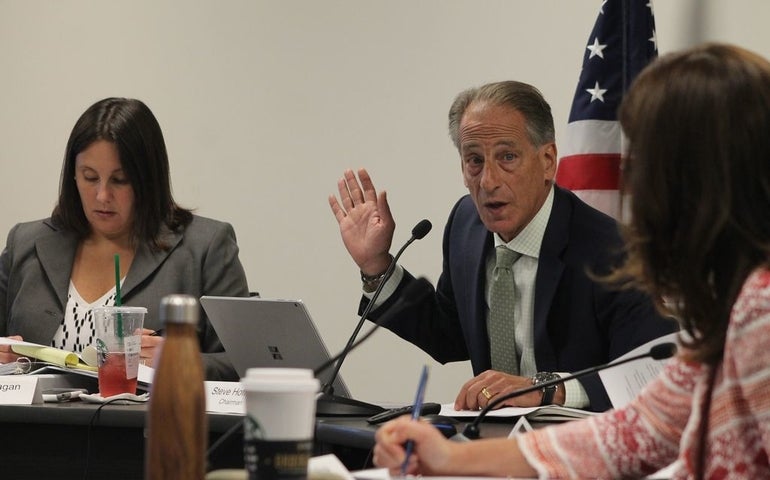Amid vape ban, CCC offers advice to medical marijuana patients
 Photo | State House News Service
Cannabis Control Commission Chairman Steven Hoffman at a meeting prior to the coronavirus pandemic
Photo | State House News Service
Cannabis Control Commission Chairman Steven Hoffman at a meeting prior to the coronavirus pandemic
The Cannabis Control Commission is explicitly advising consumers to only buy cannabis products from licensed stores and has recommended that medical marijuana patients who vaporize their medicine contact their doctor to find an alternative during Gov. Charlie Baker's four-month ban on vaping products.
Since Baker banned the sales of all nicotine or marijuana vape products on Tuesday, marijuana consumers and medical patients who do not want to smoke their cannabis have been told to seek alternatives, like edibles or topicals. The CCC said it has heard from a lot of those people in the last two days.
"Since the Administration's announcement, the Commission has received a significant number of inquiries across all constituencies and continues to advise the patients who contact the agency to communicate directly with their certifying doctor or clinician for advice on alternative methods to vaping," the CCC said in a statement, though the agency did not provide an estimate of the number of calls and emails it has received.
On Wednesday, the CCC issued memos to medical marijuana patients, medical marijuana treatment centers and non-medical retailers, and clinicians who certify patients for inclusion in the medical program to explain the governor's ban and recommend next steps while federal and state public health officials continue to investigate a spate of lung illnesses connected to vaping nicotine and/or THC derived from marijuana.
Retailers are being asked to tell any "patients/customers [who] report symptoms such as shortness of breath, fatigue, chest pain, cough, and weight loss that they believe are related to vaporizing" to contact their health care provider.
While the U.S. Centers for Disease Control has said that it does "not yet know the specific cause of these lung injuries" and that its investigation "has not identified any specific e-cigarette or vaping product" connected to all incidents, the U.S. Food and Drug Administration has said that "at least one of the associated deaths that has been publicly disclosed appears to have been related to illicit THC vaping products."
The CCC advised patients and consumers to "purchase cannabis products only from licensed entities" and not to "modify cannabis products or add any substances to these products that are not intended by the manufacturer." On Wednesday, one member of the CCC said she is concerned that the governor's ban will push people to purchase illicit vape products.
In its memo to dispensaries and retailers, the CCC makes clear that no licensee is to "sell vaping cartridges, devices and accessories, or refills for cartridges" and pointed business owners to signs created by the Department of Public Health for use by retailers.
Working with its third-party seed-to-sale tracking vendor, the CCC also created the ability for licensees to "quarantine" their inventory of vaping products within the tracking system for management purposes. The Metrc tracking system, the CCC said, "is capable of detecting sales that violate the Governor's order."
Based on a one-week sales snapshot provided by the Cannabis Control Commission, concentrates, including vape cartridges, account for roughly 20 percent of all legal marijuana product purchases in Massachusetts. Marijuana flower or buds make up just less than half of all items purchased at licensed stores.
Hours before the governor announced his vaping ban Tuesday, the CCC voted to finalize new industry regulations. Among those new rules is a requirement that extract and concentrate manufacturers include on their products' lists of ingredients of every additive used in the product, including thickening agents and specific terpenes, which are oils that naturally occur in cannabis and contribute to its distinctive odor.
The CCC said Thursday that it will soon issue a voluntary survey to its licensees to collect input on the current use of additives, thickening or thinning agents, cutting agents and terpenes in vaporizer cartridges and other concentrates. The survey answers, the CCC said, will "help the Commission build policies on production of cannabis concentrates."









0 Comments